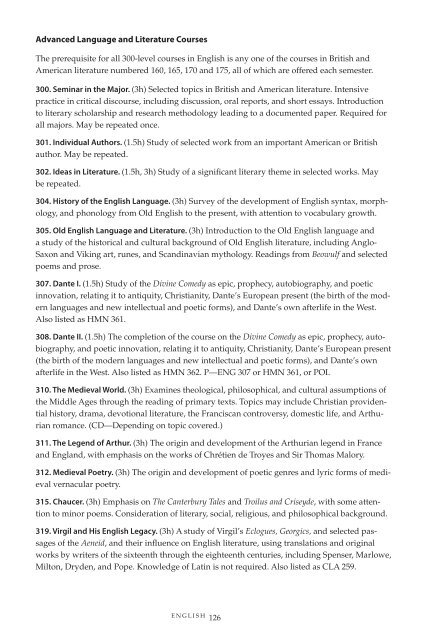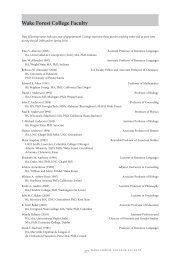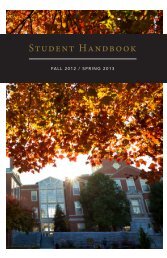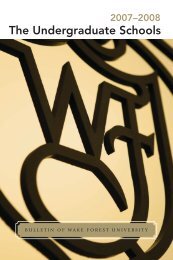theundergraduateschoo ls - Wake Forest University
theundergraduateschoo ls - Wake Forest University
theundergraduateschoo ls - Wake Forest University
Create successful ePaper yourself
Turn your PDF publications into a flip-book with our unique Google optimized e-Paper software.
Advanced Language and Literature Courses<br />
The prerequisite for all 300-level courses in English is any one of the courses in British and<br />
American literature numbered 160, 165, 170 and 175, all of which are offered each semester.<br />
300. Seminar in the Major. (3h) Selected topics in British and American literature. Intensive<br />
practice in critical discourse, including discussion, oral reports, and short essays. Introduction<br />
to literary scholarship and research methodology leading to a documented paper. Required for<br />
all majors. May be repeated once.<br />
301. Individual Authors. (1.5h) Study of selected work from an important American or British<br />
author. May be repeated.<br />
302. Ideas in Literature. (1.5h, 3h) Study of a significant literary theme in selected works. May<br />
be repeated.<br />
304. History of the English Language. (3h) Survey of the development of English syntax, morphology,<br />
and phonology from Old English to the present, with attention to vocabulary growth.<br />
305. Old English Language and Literature. (3h) Introduction to the Old English language and<br />
a study of the historical and cultural background of Old English literature, including Anglo-<br />
Saxon and Viking art, runes, and Scandinavian mythology. Readings from Beowulf and selected<br />
poems and prose.<br />
307. Dante I. (1.5h) Study of the Divine Comedy as epic, prophecy, autobiography, and poetic<br />
innovation, relating it to antiquity, Christianity, Dante’s European present (the birth of the modern<br />
languages and new intellectual and poetic forms), and Dante’s own afterlife in the West.<br />
A<strong>ls</strong>o listed as HMN 361.<br />
308. Dante II. (1.5h) The completion of the course on the Divine Comedy as epic, prophecy, autobiography,<br />
and poetic innovation, relating it to antiquity, Christianity, Dante’s European present<br />
(the birth of the modern languages and new intellectual and poetic forms), and Dante’s own<br />
afterlife in the West. A<strong>ls</strong>o listed as HMN 362. P—ENG 307 or HMN 361, or POI.<br />
310. The Medieval World. (3h) Examines theological, philosophical, and cultural assumptions of<br />
the Middle Ages through the reading of primary texts. Topics may include Christian providential<br />
history, drama, devotional literature, the Franciscan controversy, domestic life, and Arthurian<br />
romance. (CD—Depending on topic covered.)<br />
311. The Legend of Arthur. (3h) The origin and development of the Arthurian legend in France<br />
and England, with emphasis on the works of Chrétien de Troyes and Sir Thomas Malory.<br />
312. Medieval Poetry. (3h) The origin and development of poetic genres and lyric forms of medieval<br />
vernacular poetry.<br />
315. Chaucer. (3h) Emphasis on The Canterbury Tales and Troilus and Criseyde, with some attention<br />
to minor poems. Consideration of literary, social, religious, and philosophical background.<br />
319. Virgil and His English Legacy. (3h) A study of Virgil’s Eclogues, Georgics, and selected passages<br />
of the Aeneid, and their influence on English literature, using translations and original<br />
works by writers of the sixteenth through the eighteenth centuries, including Spenser, Marlowe,<br />
Milton, Dryden, and Pope. Knowledge of Latin is not required. A<strong>ls</strong>o listed as CLA 259.<br />
E N G L I S H 126






